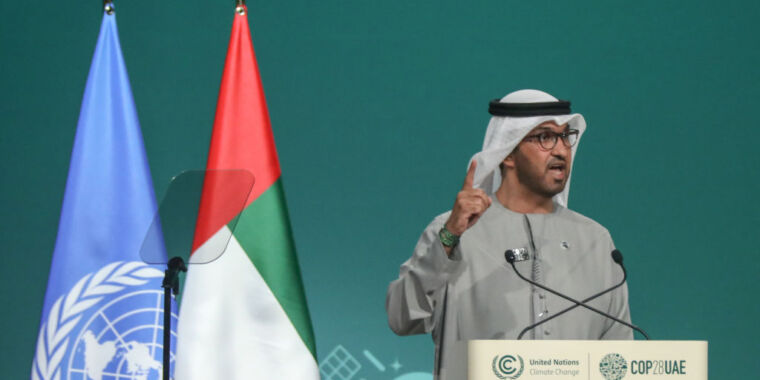Enlarge / Sultan Ahmed Al Jaber defied expectations to deliver a document that explicitly calls for limits on fossil fuel use.
On Wednesday, the UN’s COP28 meeting wrapped up with a major success: Despite a bruising fight with OPEC nations, the closing agreement included a call for a transition away from fossil fuels. There’s still plenty here for various parties to dislike, but this is the first agreement that makes the implications of the Paris Treaty explicit: We can’t limit climate change and continue to burn fossil fuels at anything close to the rate we currently do.
Beyond that, however, the report has something to disappoint everyone. It catalogs strong signs of incremental progress toward the Paris goals while acknowledging we’re running out of time for further increments. And the steps it calls for will likely keep changes on a similar trajectory.
Taking stock
The new document is called a “Global Stocktake” in reference to checking the world’s progress toward the goals of the Paris Agreement: limit climate change to 2° C above preindustrial temperatures and try to keep it to 1.5° C. That agreement called for nations to make pledges to limit greenhouse gas emissions; initial pledges were insufficient, but regular meetings of the Conference of the Parties (COP) would allow the pledges to be updated, raising their aggressiveness until the world is on a trajectory toward meeting its goals.
As part of this process, the COP meetings would also issue guidance on steps to make this process more effective. But, because of the structure of the Paris Agreement, the Stocktake document’s evaluation and guidance need to have unanimous agreement from every nation participating. That set up a situation where OPEC nations, which have a large financial interest in the continued use of fossil fuels, could potentially veto language that recognizes we need to largely stop using them to meet our climate goals.
Advertisement
Early drafts of the guidance had several aggressive steps that were largely uncontroversial, notably tripling global renewable energy capacity by 2030, phasing down the use of coal power that’s not coupled with carbon capture from its emissions, and accelerating the use of low- and zero-emission vehicles. Similarly, a call for the phase-out of fossil “fuel subsidies that do not address energy poverty or just transitions” stayed in the final statement.
There was, however, a fight over a key phrase in the drafts: “An orderly and just phase out of fossil fuels.” OPEC countries wanted that eliminated, and it was absent from some recent drafts. While that didn’t make it into the final draft, it was replaced by something remarkably similar: “Transitioning away from fossil fuels in energy systems, in a just, orderly and equitable manner.”
That phrasing allows for the continued use of fossil fuels in the chemical industry, providing some comfort to current producers. It could also seemingly be read to allow continued use in transportation—except that the language elsewhere on zero-emissions vehicles precludes that.
Similar language was added in separate goals that also seems to limit any potential loopholes for fossil fuels to sneak back in. These include “Accelerating efforts globally towards net zero emission energy systems, utilizing zero- and low-carbon fuels well before or by around mid-century.” Similarly, an additional new goal calls for “Accelerating zero- and low-emission technologies, including, inter alia, renewables, nuclear, abatement and removal technologies such as carbon capture and utilization and storage.”
And while the report highlights a potential role for lower carbon “transitional fuels,” it also specifically calls for reducing methane emissions.

